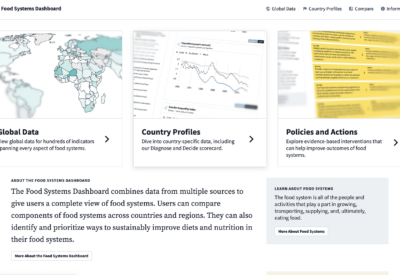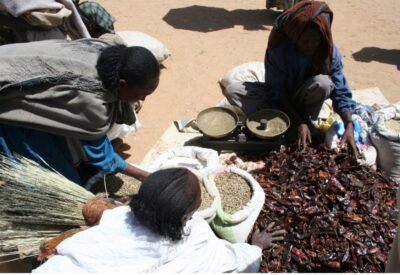The Global Food Ethics and Policy Program serves to deepen Johns Hopkins research collaborations and partnerships working on vexing food ethics and policy challenges and connects scholars and scientists to the societal players who areshaping the global food system.
The Global Challenge
Three of the biggest problems the world faces in the twenty-first century are (1) the burden of chronic, costly diseases such as diabetes and hypertension; (2) the consequences of climate change and natural resource degradation; and (3) the massive economic and social inequities that exist within and among nations. All three are directly related to the food we eat.
Our food systems are a wonder of the modern world. They efficiently supply almost eight billion people with enough food to survive. However, the foods we eat also contribute to increasingly common and burdensome health problems worldwide. Although hunger rates have been decreasing over the past 25 years, many people remain food insecure—not knowing when and from where their next meal will come. Many women and children still struggle with undernutrition, and at the same time, obesity and diet-related chronic diseases are rising everywhere. Concurrently, food systems are placing a growing burden on the health of our planet. They are responsible for roughly 10 to 24 percent of global greenhouse gas emissions, which are increasing temperatures, changing precipitation patterns, and acidifying the oceans. At the same time, agricultural production is susceptible to a changing climate, making it increasingly challenging to produce enough food for a growing population. There is increasing variability in the climate, with less predictability, and extreme weather events are on the rise. The world’s population is growing and rapidly urbanizing. Geopolitical conflicts threaten sustainable development, while global democracies become increasingly fragile. By 2050, the global population is expected to reach 10 billion people. This population growth will increase the demand for food, which will put unprecedented stresses on the environment, natural resources, and ecosystems that humans depend on.
How can we nourish the global population in ways that align with positive social, health, environmental, and economic outcomes? Over 800 million people are hungry, and another 2.1 billion are overweight or obese. At the same time, roughly 20% of the world’s children under the age of five suffer from chronic undernutrition.
Our work focuses on bringing about a more equitable, ethical, and sustainable global food system.
JHU’s Global Food Ethics and Policy Program
The Global Food Ethics and Policy Program of Johns Hopkins University is an interdisciplinary program dedicated to ensuring food systems and policies improve the health and sustainability of people, the environment, economies, and societies.
We do this by doing research and generating evidence on how food systems function and how policies are working to address some of the most vexing issues across the food and environment landscape.
The Program works across three pillars to carry out its goals:
- Research & Evidence Generation: Generate and disseminate new scientific evidence and ethics scholarship that holds political and societal relevance to food system challenges (climate and environment, social equity and justice, population growth, rapid urbanization and transformation, health, etc.).
-
Education & Training: Build the capacity of the next generation of educators, policymakers, and development practitioners so that they can lead in sustainable food systems and ethics. The Program helps to advance training and skillsets to adapt to global trends and drivers across increasingly interconnected food systems.
-
Policy & Strategy: Provide policy-relevant guidance and foresight on ethical, political, social, health, and nutrition issues connected to food systems.
what Drives our work
- Food systems are disrupting the climate and degrading natural resources, which is creating a feedback loop that in turn further impacts food systems.
- Nutrition and food security are not improving for many people and worsening in some regions and among certain demographics
- Dietary patterns are unhealthy and unsustainable for a significant proportion of the world’s population
- Much of the global population is unable to afford or access a nutritious diet.
- Current data and analyses are insufficient to understand the state of food systems, their dynamics, and how workers and consumers benefit or fail to benefit from food systems.
- There are many trade-offs when it comes to transforming our food systems that come with a complex set of ethical and equity implications
the program focuses on three areas of research
- Improving food system decision making
Policymakers are often in the dark about how food systems are performing, potential near- and long-term risks, and where to intervene. The Program is developing better data tools, metrics, and models to unpack some of the most complex food systems science issues to allow for better decision-making and potential trade-offs. The research focuses on better informing policy and programs that are geared towards improving food security; diets, nutrition, and health; climate change and environment; and equitable livelihoods. - Understanding how foods capes influence diets
Geography place and land/urbanscapes are influencing what foods are grown and where, and what foods are available and accessible. Geopolitics, climate change, urbanization, and population pressures are changing foodscapes in profound ways that are, in turn, influencing people’s access to healthy and sustainable diets. The Program is undertaking field-level research to better understand how “place” is influencing diets around the world. - Exploring the most vexing ethical debates in food systems dialogues and policy
There are contested visions of what it means to feed the world ethically. Disagreements exist about what values, beyond human health, should be considered, what trade-offs (if any) between values are justifiable in the short- and long-term, and what systems and strategies for the production, distribution, marketing, sale, and consumption of food are ethically acceptable. Stemming from the 7 x 5 Agenda for Ethics and Global Food Security Project completed in 2015 by Johns Hopkins University, the Program is investigating a range of ethical issues and disagreements in global food policy and practice.




